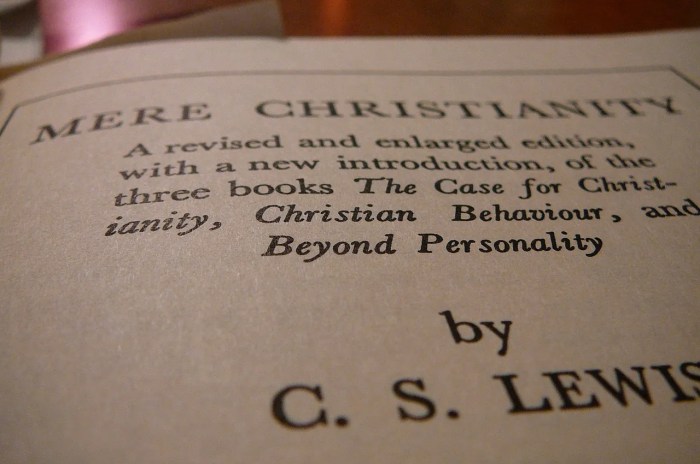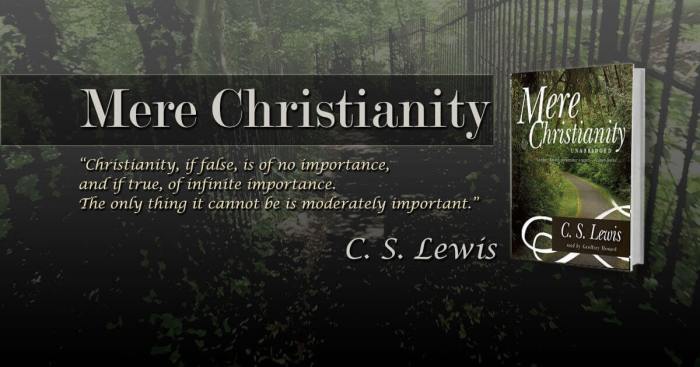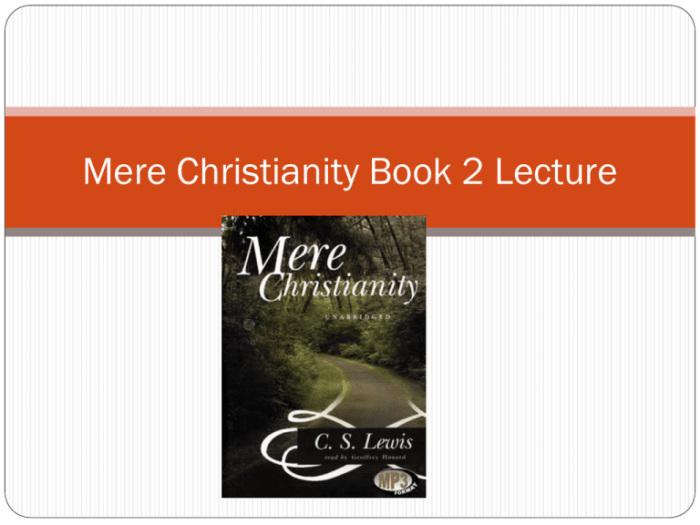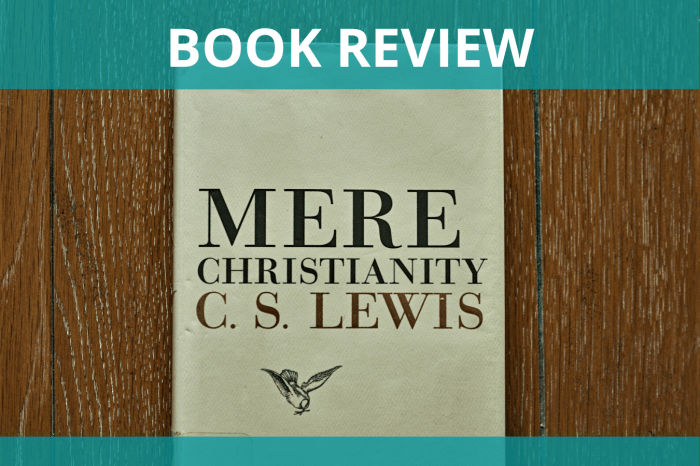Summary of mere christianity book 2 – Delving into the depths of C.S. Lewis’s seminal work, Mere Christianity Book 2, this comprehensive summary unravels the profound themes and arguments that have shaped Christian thought and practice for generations. Exploring the nature of God, sin, redemption, and the ethical implications of faith, this analysis provides a captivating overview of Lewis’s influential treatise.
The second book of Mere Christianity offers a profound exploration of the ethical dimensions of Christian living, delving into the nature of morality, virtue, and the practical application of faith in everyday life. Lewis’s insights into the human condition and the pursuit of a meaningful existence continue to resonate with readers today.
Key Concepts of Mere Christianity Book 2

Book 2 of Mere Christianity explores the nature of God, sin, and redemption. It builds upon the foundation laid in Book 1, providing a deeper understanding of the Christian faith.
C.S. Lewis argues that the existence of God can be inferred from the natural world and human experience. He presents the argument from morality, suggesting that the universal moral law points to a transcendent source of goodness. He also examines the problem of evil, arguing that it does not disprove the existence of God but rather points to the reality of sin.
The Nature of God
Lewis describes God as a personal being who is both transcendent and immanent. He is the creator of the universe and the sustainer of all life. Lewis emphasizes the importance of worship and prayer in our relationship with God.
Sin
Lewis defines sin as any action or thought that falls short of God’s perfect standard. He argues that sin is not merely a matter of breaking rules but a fundamental rebellion against God. Lewis explores the consequences of sin, including guilt, shame, and separation from God.
Redemption
Lewis presents the Christian message of redemption as the solution to the problem of sin. He argues that Jesus Christ came to earth to die on the cross as a sacrifice for our sins. Through faith in Jesus, we can receive forgiveness and reconciliation with God.
Ethical Implications of Mere Christianity Book 2

C.S. Lewis’s Mere Christianity Book 2 explores the ethical implications of his teachings on morality and virtue. Lewis argues that humans have a natural moral law inscribed in their hearts, which guides them towards good and away from evil. He also emphasizes the importance of humility, forgiveness, and love in Christian ethics.
Lewis’s ethical teachings have several practical implications for everyday life. First, they provide a framework for making moral decisions. By reflecting on the natural moral law and the teachings of Christ, Christians can discern what is right and wrong in specific situations.
Applying Lewis’s Ethics to Everyday Life
Second, Lewis’s ethics emphasize the importance of character development. Christians are called to grow in virtue, which is the disposition to do good. This involves cultivating habits such as honesty, kindness, and self-control.
Third, Lewis’s ethics promote social harmony. By following the natural moral law and the teachings of Christ, Christians can build relationships based on love and respect. They can also work together to create a more just and peaceful world.
Historical and Cultural Context of Mere Christianity Book 2

Mere Christianity Book 2 was written during World War II, a time of great upheaval and uncertainty. The war had a profound impact on the intellectual and social climate of the time, and Lewis’s book reflects this context in several ways.
Intellectual Climate
The war led to a widespread questioning of traditional values and beliefs. Many people were disillusioned with the promises of progress and enlightenment that had dominated the early 20th century. Lewis’s book sought to address this disillusionment by offering a compelling defense of the Christian faith.
Social Climate
The war also had a significant impact on the social climate of the time. The war brought people together from all walks of life, and it led to a greater sense of community and solidarity. Lewis’s book reflects this sense of community by emphasizing the importance of love and forgiveness.
Literary Analysis of Mere Christianity Book 2

Lewis employs a conversational and accessible writing style in Book 2, using simple language and avoiding technical jargon. This approach makes his arguments relatable and easy to understand, even for readers unfamiliar with philosophical or theological concepts.
Use of Analogies and Metaphors
Lewis frequently employs analogies and metaphors to illustrate complex ideas and make them more concrete. For example, he compares the human conscience to a radio set, with God as the sender and our conscience as the receiver. These vivid comparisons help readers grasp abstract concepts and relate them to their own experiences.
Emphasizing Common Ground
Throughout Book 2, Lewis emphasizes common ground with his readers, acknowledging shared experiences and values. He appeals to the reader’s sense of morality and reason, rather than relying solely on religious authority. By establishing this connection, Lewis builds trust and credibility, making his arguments more persuasive.
Humor and Wit
Lewis incorporates humor and wit into his writing, using irony and satire to engage readers and make his points more memorable. For example, he describes the idea of a purely subjective morality as “the view that if I say it’s right, it is right.”
This lighthearted approach helps alleviate the potentially dry nature of philosophical discussions and keeps readers entertained.
Personal Anecdotes, Summary of mere christianity book 2
Lewis frequently shares personal anecdotes and experiences to illustrate his arguments and connect with readers on a human level. By sharing his own struggles and doubts, he demonstrates that he is not simply preaching from an ivory tower but has grappled with the same questions and concerns as his readers.
Comparative Analysis of Mere Christianity Book 2

Mere Christianity Book 2 stands out as a unique and compelling exploration of Christian ethics within the broader context of C.S. Lewis’s theological writings. In this section, we will compare and contrast Book 2 with other works by Lewis and Christian authors, examining the similarities and differences in their approaches to Christianity.
Similarities to Other Works by C.S. Lewis
Book 2 of Mere Christianity shares several key similarities with Lewis’s other works, particularly those focused on Christian apologetics and ethics. These include:
-
-*Emphasis on Rationality and Reason
Lewis consistently argues for the reasonableness of Christian faith, using logic, evidence, and personal experience to support his claims. This approach is evident in Book 2, where he presents a rational defense of moral values and ethical behavior.
-*Focus on the Natural Law
Lewis believes that certain moral principles are universally applicable and can be known through human reason. This concept of the natural law is a central theme in Book 2, where Lewis argues that it provides a foundation for objective morality.
-*Importance of Grace
While emphasizing the importance of moral effort, Lewis also acknowledges the need for divine grace in Christian living. This theme is explored in Book 2 through discussions of repentance, forgiveness, and the role of the Holy Spirit.
Differences from Other Christian Authors
Despite its similarities to Lewis’s other works, Book 2 also exhibits some distinct differences from the writings of other Christian authors. These include:
-
-*Emphasis on Practical Ethics
While many Christian authors focus on doctrinal or theological issues, Lewis places a strong emphasis on practical ethics in Book 2. He provides concrete guidance on how to live a virtuous life, addressing topics such as sexual morality, honesty, and forgiveness.
-*Rejection of Moral Relativism
Unlike some Christian authors who argue for a situational or relativistic approach to ethics, Lewis firmly rejects moral relativism. He contends that there are objective moral values that apply to all people, regardless of their circumstances.
-*Dialogue with Non-Christians
Book 2 is notable for its conversational style and its engagement with non-Christian readers. Lewis seeks to present Christian ethics in a way that is accessible and persuasive to those who may not share his religious beliefs.
Influence and Legacy of Mere Christianity Book 2
Mere Christianity Book 2 has exerted a profound impact on Christian thought and practice since its publication in 1952. C.S. Lewis’s accessible and compelling prose has made the book a widely read and influential work, both within and beyond Christian circles.
One of the most significant contributions of Book 2 has been its role in fostering a deeper understanding of Christian ethics. Lewis’s exploration of the “moral law” as a universal phenomenon has helped to bridge the gap between Christian and secular perspectives on ethics.
His emphasis on the importance of reason and conscience has also been influential in shaping Christian ethical thought.
Use in Christian Education
Mere Christianity Book 2 has been widely used in Christian education programs, both formal and informal. Its clear and concise exposition of Christian beliefs has made it a valuable resource for catechism and apologetics classes. The book’s engaging style has also made it popular for use in small group studies and personal reflection.
Influence on Popular Culture
Beyond its impact on Christian thought and practice, Mere Christianity Book 2 has also had a significant influence on popular culture. Lewis’s ideas have been referenced in countless works of literature, film, and music. The book’s themes of love, forgiveness, and redemption have resonated with people from all walks of life, regardless of their religious affiliation.
Common Queries: Summary Of Mere Christianity Book 2
What are the key themes of Mere Christianity Book 2?
The key themes include the nature of God, sin, redemption, and the ethical implications of faith.
How does Lewis approach the topic of ethics in Book 2?
Lewis explores the nature of morality, virtue, and the practical application of faith in everyday life.
What is the historical context of Mere Christianity Book 2?
The book reflects the intellectual and social climate of its time, addressing the challenges and doubts of a post-World War II world.